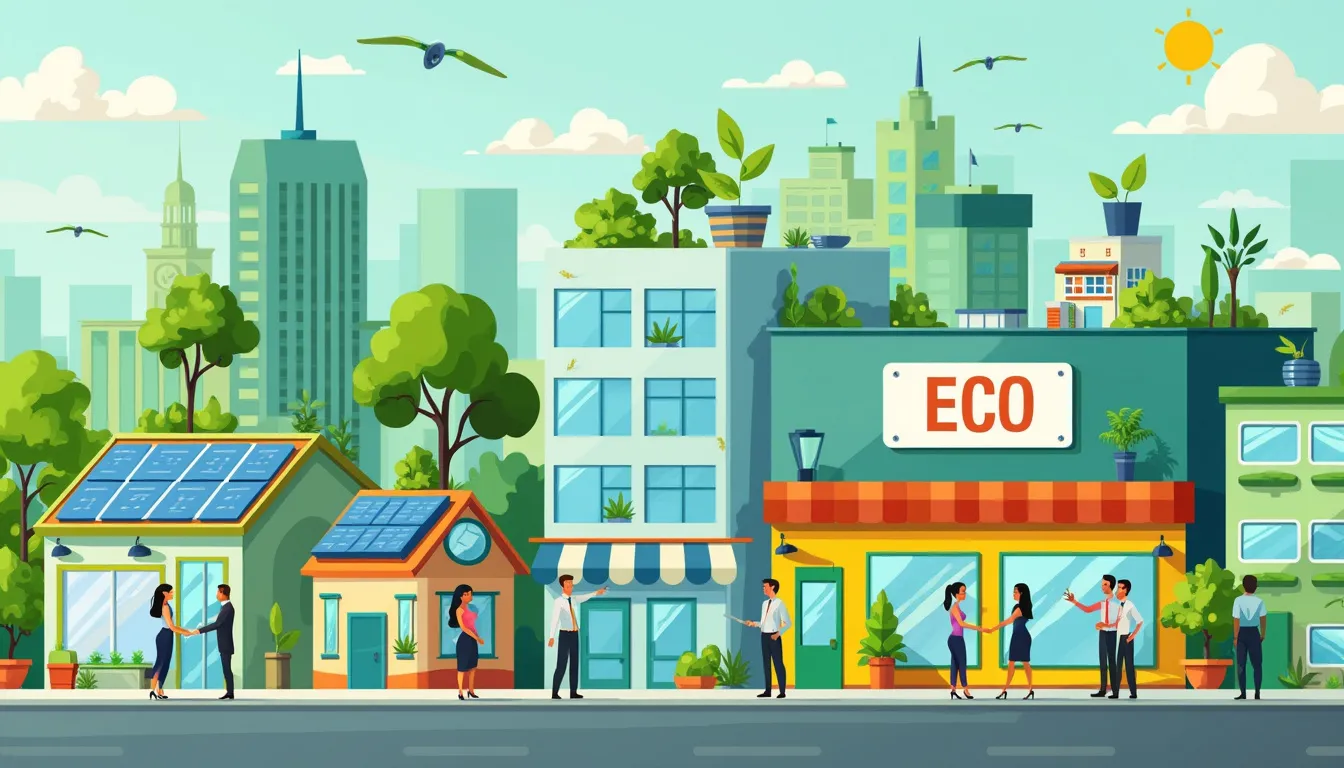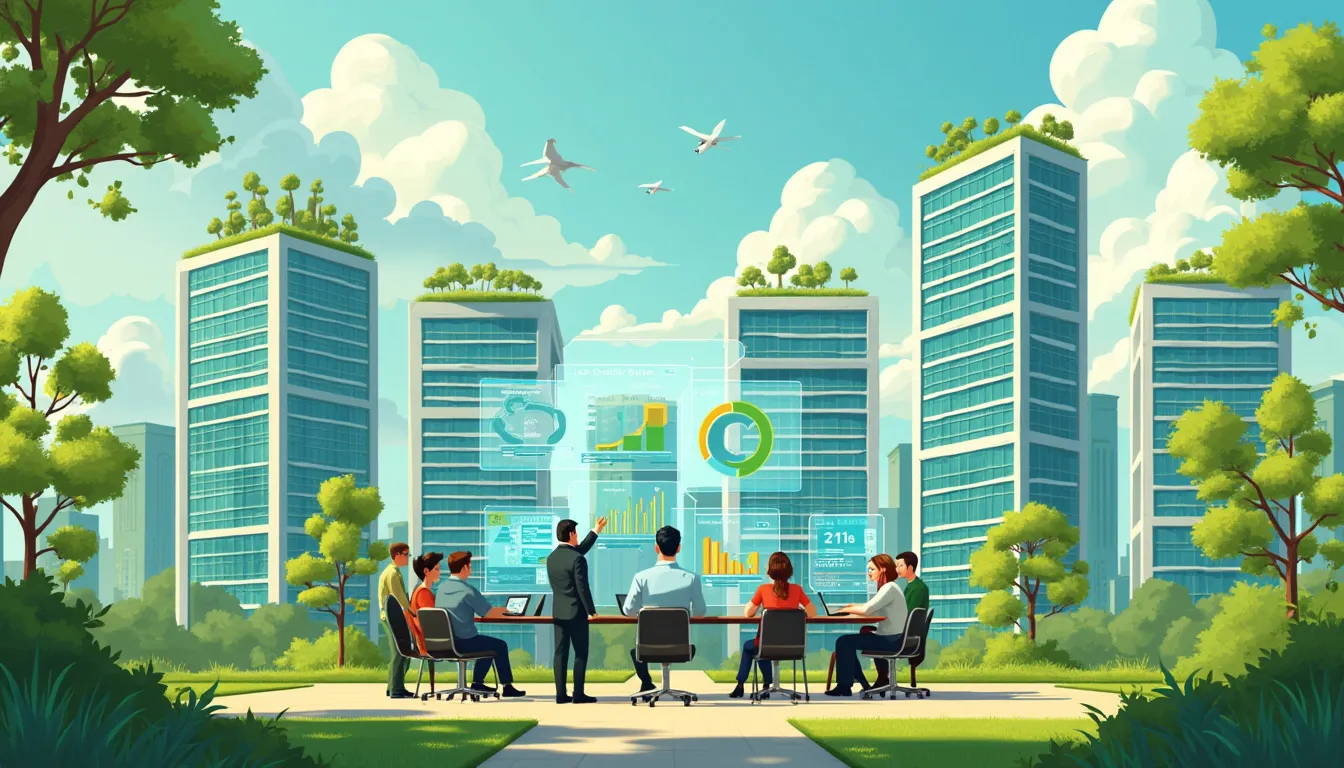Sustainability consulting has quickly become a cornerstone in the modern business world, capturing the attention and investment of enterprises seeking to navigate the complex terrain of environmental responsibility and sustainable growth. As the climate crisis accelerates and public awareness grows, companies are increasingly recognizing that sustainability is not just an optional add-on but a crucial aspect of their operations and strategy. Brands that once prioritized profit above all else are now embracing sustainable practices to build resilience, foster innovation, and cultivate a positive corporate image.
Defined broadly, sustainability consulting encompasses a range of services aimed at helping businesses operate in an eco-friendly, socially responsible manner while still achieving their financial goals. This field has evolved significantly over the past few decades. Initially driven by regulatory compliance and isolated instances of corporate social responsibility (CSR), sustainability consulting now addresses a comprehensive spectrum of business activities—from environmental impact assessments to sustainable supply chain management, and from energy efficiency initiatives to the development of green products and services.
The importance of sustainability consulting is underscored by its critical role in modern enterprises. Companies today face a landscape where sustainability is not just encouraged but expected by consumers, investors, and regulators. Studies show that businesses integrating robust sustainability strategies often outperform their less eco-conscious counterparts, indicating a growing interdependence between sustainability and long-term profitability. Moreover, sustainability consulting helps organizations navigate the complex regulatory environment, mitigate risks, and uncover opportunities for innovation and market differentiation.
By optimizing operations for sustainability, firms can significantly enhance their brand image and build a loyal customer base that values corporate responsibility. Consider businesses like Patagonia and Unilever, which have leveraged sustainability consulting to reinforce their market positions and drive competitive advantage. These companies showcase how sustainability, when embedded into the core business strategy, can lead to cost savings, enhanced efficiency, and improved stakeholder relationships.
As sustainability consulting continues to rise in importance, it is reshaping the future of business itself, demanding transparency and accountability like never before, and leveraging technological advancements to provide actionable insights. In this article, we will explore the multifaceted benefits of sustainability consulting, delve into its critical areas of focus, and examine the emerging trends that will define its trajectory in the coming years. Whether you’re an individual looking to make greener choices or a business owner aiming to integrate sustainability into your operations, the following insights and tips will equip you with the knowledge to drive meaningful change.
Introduction to Sustainability Consulting
Definition and Scope of Sustainability Consulting
Sustainability consulting is a specialized field aimed at helping businesses and organizations develop and implement strategies focused on achieving long-term environmental and social benefits. The role of sustainability consultants encompasses assessing current practices, identifying areas for improvement, and providing actionable insights to reduce environmental impact while enhancing operational efficiency and brand reputation. These professionals are instrumental in guiding companies toward sustainable business models, addressing everything from energy consumption and waste management to sustainable sourcing and employee well-being.
In the modern business context, sustainability consulting is increasingly expansive, covering a wide array of services. These may include carbon footprint analysis, development of corporate social responsibility (CSR) strategies, and the integration of sustainable practices into everyday operations. The goal is not merely compliance with regulations but fostering a culture of sustainability that permeates every level of the organization.
Evolution of Sustainability Consulting in the Business Landscape
Over the last few decades, sustainability consulting has transitioned from a niche concern to a mainstream need for businesses of all sizes. In the 1990s and early 2000s, sustainability efforts were often viewed as optional or secondary, primarily driven by environmental enthusiast organizations. However, several high-profile environmental disasters, along with growing awareness of climate change, have shifted public and regulatory expectations. This change has propelled sustainability to the forefront of business strategy.
Forward-thinking companies like Patagonia, IKEA, and Unilever have set benchmarks by embedding sustainability deeply into their business models. Their success stories have shown that committing to sustainability is not just ethically commendable, but also profitable in the long term. This evolution has solidified the role of sustainability consultants who provide expertise that translates ambitious sustainability goals into practicable initiatives.
Importance of Sustainability Consulting in Modern Enterprises
In today’s rapidly evolving market, the importance of sustainability consulting cannot be overstated. Firstly, sustainability consultants help companies navigate the complex web of environmental regulations and standards, which can vary significantly across different regions and industries. Compliance is crucial to avoid fines, sanctions, and reputational damage.
Moreover, sustainability consulting plays a critical role in enhancing a company’s reputation. Consumers today are increasingly conscious of the environmental and ethical implications of their purchases. According to a 2020 IBM study, nearly 60% of consumers are willing to change their shopping habits to reduce environmental impact. By working with sustainability consultants, businesses can craft and communicate authentic sustainability narratives that resonate with modern, eco-conscious consumers.
Another key aspect is cost optimization. Sustainability consulting often reveals opportunities for significant cost savings through energy-efficient practices, waste reduction, and resource optimization. For instance, businesses can drastically reduce utility bills by implementing energy-efficient solutions recommended by consultants. Beyond the immediate financial benefits, these practices also contribute to long-term resilience against resource scarcity and increasing regulatory costs.
Sustainability consulting also fosters innovation. Consultants bring an external perspective and a wealth of experience from various sectors, inspiring companies to explore novel approaches and technologies. Whether it’s through adopting renewable energy solutions or pioneering sustainable product designs, these innovations can propel a business ahead of its competitors.
Finally, sustainability consulting aids in risk management. Environmental risks, such as those related to climate change, can have far-reaching impacts on supply chains, regulations, and market expectations. Consultants help businesses anticipate and mitigate these risks, ensuring continuity and long-term viability.
In summary, sustainability consulting has become an indispensable part of modern enterprise strategy. It helps businesses ensure regulatory compliance, boost their brand image, achieve cost savings, drive innovation, and manage risks effectively. For any business aiming to thrive in today’s environmentally conscious market, the expertise of sustainability consultants is not just beneficial but essential.

Key Benefits of Sustainability Consulting for Businesses
Enhancing Corporate Reputation and Brand Image
Sustainability consulting plays a crucial role in enhancing corporate reputation and brand image. In an era where consumers are increasingly conscious of their environmental impact, businesses demonstrating a commitment to sustainability can significantly boost their public image. According to a survey from Nielsen, 81% of global respondents feel strongly that companies should help improve the environment. By integrating sustainability practices with the help of expert consultants, businesses can showcase their dedication to environmental and social responsibility, thereby attracting eco-conscious consumers and fostering brand loyalty.
One real-world example is Patagonia, a company renowned for its commitment to sustainability. Their Don’t Buy This Jacket campaign, which urged consumers to consider the environmental impact of their purchases, was a bold move enabled by robust sustainability strategies. This approach not only reinforced their brand ethos but also established them as a leader in sustainable business practices.
Achieving Cost Savings through Energy Efficiency and Waste Reduction
One of the most immediate and tangible benefits of sustainability consulting is cost savings. Consultants help businesses identify areas where energy efficiency can be improved and waste reduced, which translates to significant financial savings. For instance, the Carbon Trust reports that UK businesses could save up to £1.6 billion annually by implementing simple energy-efficiency measures.
Consider the example of General Motors (GM), which has implemented several sustainability initiatives leading to cost savings. By focusing on energy efficiency and waste reduction, GM reported saving over $90 million annually. Such financial benefits not only improve the bottom line but also make a compelling case for the broader adoption of sustainable practices across industries.
Regulatory Compliance and Risk Management
Navigating the complex landscape of environmental regulations can be challenging for businesses, especially as these regulations become increasingly stringent. Sustainability consulting provides expert guidance to ensure compliance with local, national, and international environmental laws and standards, thereby mitigating legal risks and potential fines.
Sustainability consultants also help businesses adopt proactive risk management strategies. By conducting thorough environmental impact assessments and identifying potential risks, consultants enable businesses to develop contingency plans and enhance their resilience against future environmental challenges. This proactive approach not only helps in staying compliant but also in safeguarding the company’s long-term viability.
Driving Innovation and Competitive Advantage
Sustainability consulting drives innovation by encouraging businesses to think creatively about resource use and process optimization. By fostering a culture of sustainability, companies are more likely to develop innovative products and services that meet the growing demand for sustainable solutions.
Consider Unilever’s Sustainable Living Plan, which is heavily guided by sustainability consulting. This initiative has led to the development of new products with reduced environmental impact and has positioned Unilever as a leader in corporate sustainability. The plan has resulted in improved financial performance, demonstrating that innovation driven by sustainability consulting can yield significant competitive advantages.
Moreover, companies that engage in sustainability consulting often find themselves ahead of the curve, with early adoption of sustainable practices providing a market edge. As consumer preference for sustainable products grows, businesses that prioritize sustainability are better positioned to capture new market segments and strengthen their competitive standing.
Conclusion
In summary, the benefits of sustainability consulting for businesses are manifold. From enhancing corporate reputation and brand image to achieving cost savings through energy efficiency and waste reduction, the advantages are clear and compelling. Moreover, sustainability consulting helps businesses navigate regulatory complexities and manage risks, driving innovation and providing a competitive edge. As sustainability continues to gain prominence in the corporate world, those businesses that integrate it into their core strategies will be the ones leading the charge toward a more sustainable future.

Critical Areas Addressed by Sustainability Consulting
Environmental Impact Assessments and Carbon Footprint Analysis
At the heart of sustainability consulting lies the necessity to understand the environmental impact of business operations. Conducting an environmental impact assessment (EIA) is a crucial first step. It involves a thorough review of a company’s activities, identifying how they affect everything from local ecosystems to global climate patterns. Equipped with this knowledge, businesses can make more informed decisions aimed at minimizing their ecological footprint.
Another vital component is carbon footprint analysis. This process assesses the total greenhouse gas emissions produced directly and indirectly by an organization. Sustainability consultants guide businesses through calculating their carbon footprint, helping them to not only comply with increasingly stringent regulations but also to devise strategies for carbon reduction. For example, switching to renewable energy sources or optimizing logistics can significantly lower emissions. Companies like Patagonia have made headlines for their commitment to carbon neutrality, demonstrating that proactive measures can also bolster brand loyalty and reputation.
Sustainable Supply Chain Management
The global nature of modern supply chains often obscures the environmental and social impacts of production and distribution. Sustainability consulting brings transparency and efficiency to these complex networks. By conducting supply chain audits and encouraging practices like fair trade sourcing or utilizing recycled materials, consultants help businesses reduce their overall environmental footprints and improve social equity.
For instance, consider how Unilever has leveraged sustainability consulting to project its corporate responsibility across its supply chain. Unilever’s commitment to sourcing 100% of its agricultural raw materials sustainably by 2023 has not only reduced its environmental footprint but also fostered stronger relationships with suppliers and customers. By investing in sustainable supply chain management, companies can reduce waste, enhance efficiency, and promote fair labor practices—a triple win for the environment, society, and business performance.
Corporate Social Responsibility (CSR) Strategies
Corporate social responsibility (CSR) extends beyond environmental sustainability to encompass a company’s broader impact on society. Effective CSR strategies bolster a company’s commitment to ethical practices, community engagement, and environmental stewardship. Sustainability consulting helps businesses craft and implement robust CSR strategies that resonate with stakeholders and align with organizational values.
Take the example of Hershey’s Shared Goodness Promise. Through comprehensive sustainability consulting, Hershey has developed a CSR framework that integrates sustainable practices into all facets of their business—from environmentally friendly cocoa farming to community-building initiatives. This not only enhances the company’s ethical standing but also drives employee engagement and consumer trust. By embedding CSR into the core business strategy, companies can create long-term value for both society and their bottom line.
Sustainable Product and Service Development
In an era where consumer preferences increasingly favor sustainability, developing environmentally friendly products and services is a competitive advantage. Sustainability consulting offers critical insights and methodologies for designing and marketing green products. From using eco-friendly materials to innovative circular economy models, consultants guide businesses through the transition to sustainable offerings.
A shining example is Interface, Inc., a modular carpet company that has revolutionized its product development by fully embracing sustainability principles. Led by their influential “Mission Zero” initiative, Interface aims for a zero environmental footprint by 2020. This ambitious goal has spurred innovation in product design, including the use of recycled materials and the creation of products that are fully recyclable at the end of their life cycle. Such initiatives do more than protect the planet; they also attract eco-conscious consumers and drive market differentiation.
In each of these critical areas, sustainability consulting plays a pivotal role. By encompassing environmental assessments, supply chain management, CSR strategies, and sustainable product development, consultants empower businesses to not only meet regulatory requirements but also innovate and thrive in a rapidly evolving market. These efforts yield immediate benefits, like cost savings and enhanced reputation, while also positioning companies for long-term resilience and success in a world that increasingly values sustainability.

Future Trends in Sustainability Consulting
Increasing Demand for Transparency and Accountability
In today’s digital age, where information travels at lightning speed, businesses are under unprecedented scrutiny regarding their environmental and social footprints. Consumers, investors, and regulatory bodies are increasingly demanding greater transparency and accountability from companies. Sustainability consulting is evolving to meet these demands by helping businesses develop comprehensive reporting systems and frameworks, such as the Global Reporting Initiative (GRI) and the Sustainability Accounting Standards Board (SASB). These frameworks facilitate better communication of sustainability efforts, ensuring that stakeholders are well-informed and engaged. This growing need for transparency doesn’t just polish a company’s image; it fosters trust and can significantly enhance long-term business success.
The Role of Technology and Data Analytics in Sustainability Consulting
Technology and data analytics are revolutionizing the field of sustainability consulting. Advanced data collection methods, such as Internet of Things (IoT) devices, enable real-time monitoring of resource usage and emissions. For instance, smart meters and sensors can provide precise data on energy consumption and waste generation, allowing companies to make informed decisions that enhance efficiency and reduce environmental impact. Furthermore, data analytics platforms analyze vast amounts of information to identify trends, predict outcomes, and suggest actionable insights. Machine learning algorithms can optimize supply chains for lower emissions and greater sustainability. This technological integration ensures that sustainability strategies are not only theoretical but deeply grounded in actionable, data-driven insights.
Integration of Sustainability into Core Business Strategies
Gone are the days when sustainability was a peripheral concern. Modern businesses are increasingly integrating sustainability into their core strategies, ensuring that it is a principal driver of growth and innovation. This shift is often guided by sustainability consultants who craft strategic plans that align environmental and social goals with business objectives. A notable example is the circular economy model, where waste materials are repurposed into new products, thus minimizing waste and resource use. Companies like Patagonia and IKEA have successfully implemented such models, demonstrating that sustainability can lead to innovative product designs and new business opportunities. By embedding sustainability into the fabric of their operations, businesses not only mitigate risks but also unlock competitive advantages and drive long-term profitability.
The Global Perspective: Sustainability Consulting Across Different Regions and Industries
Sustainability consulting is not a one-size-fits-all service; it varies widely across regions and industries, each with unique challenges and opportunities. In Europe, for instance, stringent environmental regulations drive high demand for consulting services to ensure compliance and foster innovation. In contrast, emerging markets in Asia and Africa are seeing a burgeoning need for sustainability as they balance economic growth with environmental stewardship. Industry-specific nuances further influence sustainability practices. The tech industry, often criticized for its energy consumption, is prioritizing renewable energy solutions, while the fashion industry is focusing on sustainable materials and ethical labor practices. Consultants adept in these regional and industry-specific contexts can offer tailored solutions that cater to local needs while aligning with global sustainability goals.
In summary, the future of sustainability consulting is bright and filled with transformative potential. The increasing demand for transparency, advancements in technology, deeper integration into business strategies, and a nuanced approach to different regions and industries all highlight the pivotal role sustainability consulting will play in shaping a sustainable future for businesses worldwide.
Sustainability consulting has emerged as a cornerstone in driving responsible business practices. As businesses navigate the complexities of a world facing environmental, social, and economic challenges, consulting services dedicated to sustainability provide essential expertise and guidance. These services not only help enterprises reduce their carbon footprints and make strides toward environmental stewardship but also carve out pathways for innovative growth, cost savings, and elevated brand reputation.
The critical benefits of sustainability consulting extend beyond mere compliance with regulations. Businesses can achieve significant cost reductions through energy efficiency measures and waste reduction strategies, directly impacting their bottom lines. Moreover, a commitment to sustainability enhances corporate reputations, fostering customer loyalty and stakeholder trust. When businesses show they care about more than just profits, they cultivate a positive image that resonates with increasingly eco-conscious consumers and investors.
Sustainability consulting addresses numerous pivotal areas, starting with rigorous environmental impact assessments and precise carbon footprint analyses. These evaluations provide a clear roadmap for reducing negative impacts and embracing greener practices. Sustainable supply chain management ensures that every link in the production chain adheres to eco-friendly and ethical standards, while effective CSR strategies further demonstrate a company’s dedication to positive social impact. By developing sustainable products and services, businesses not only meet growing market demands but also set themselves apart in competitive markets.
Looking ahead, sustainability consulting is poised to become even more integral to business strategies across the globe. The increasing demand for transparency and accountability will push enterprises to adopt sustainable practices more openly and rigorously. Technological advancements and data analytics will provide deeper, actionable insights that drive optimized, sustainable outcomes. Integrating sustainability into the very core of business strategies will go from being a visionary goal to an imperative, ensuring that companies remain resilient and forward-thinking in a rapidly changing world.
Now, it’s clear that sustainability consulting is not just an optional add-on but a critical driver of modern business success. As individuals and business owners, taking actionable steps towards sustainability is within our reach. Start small by conducting a sustainability audit of your operations, adopting energy-efficient practices, and engaging employees in green initiatives. The journey towards a sustainable future begins today—with informed choices, visionary consulting, and a collective commitment to making a positive impact on our planet.
Support Us: Check out our recommended products on Amazon.

